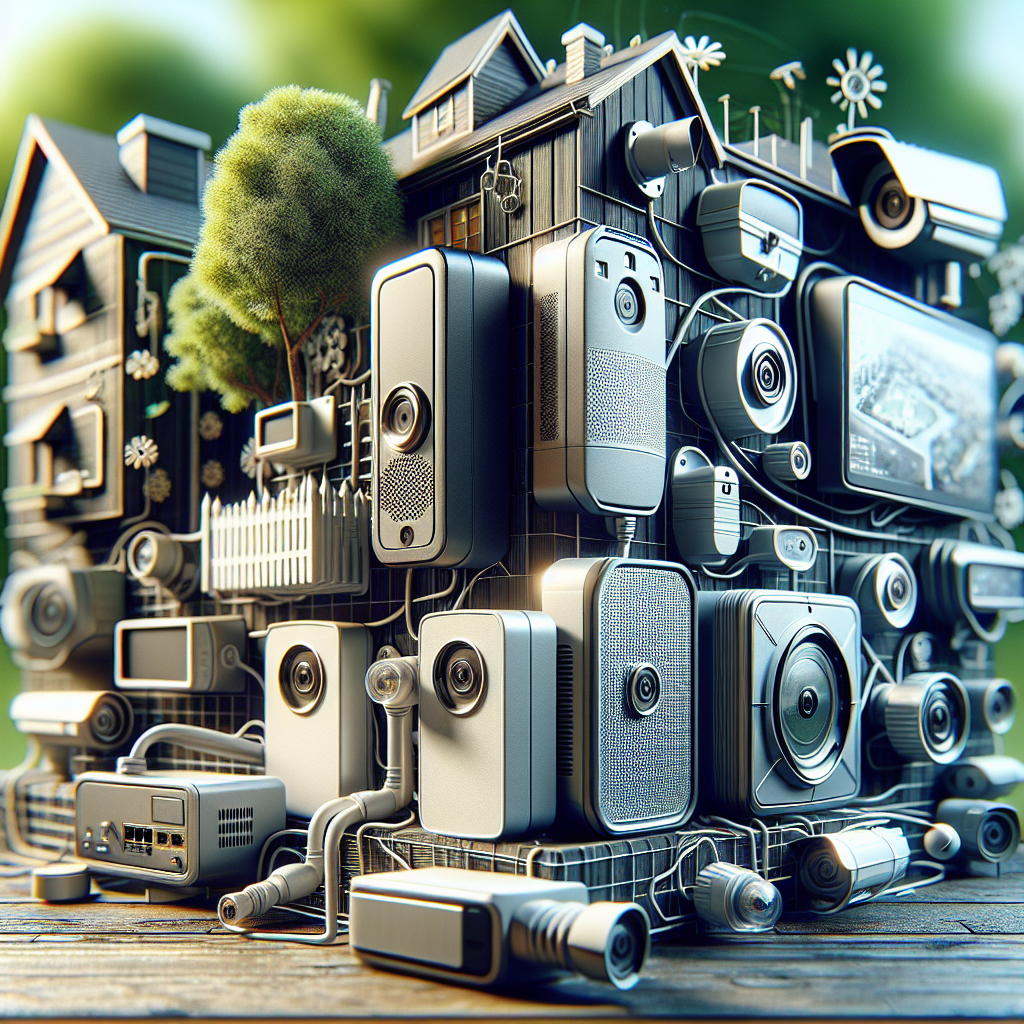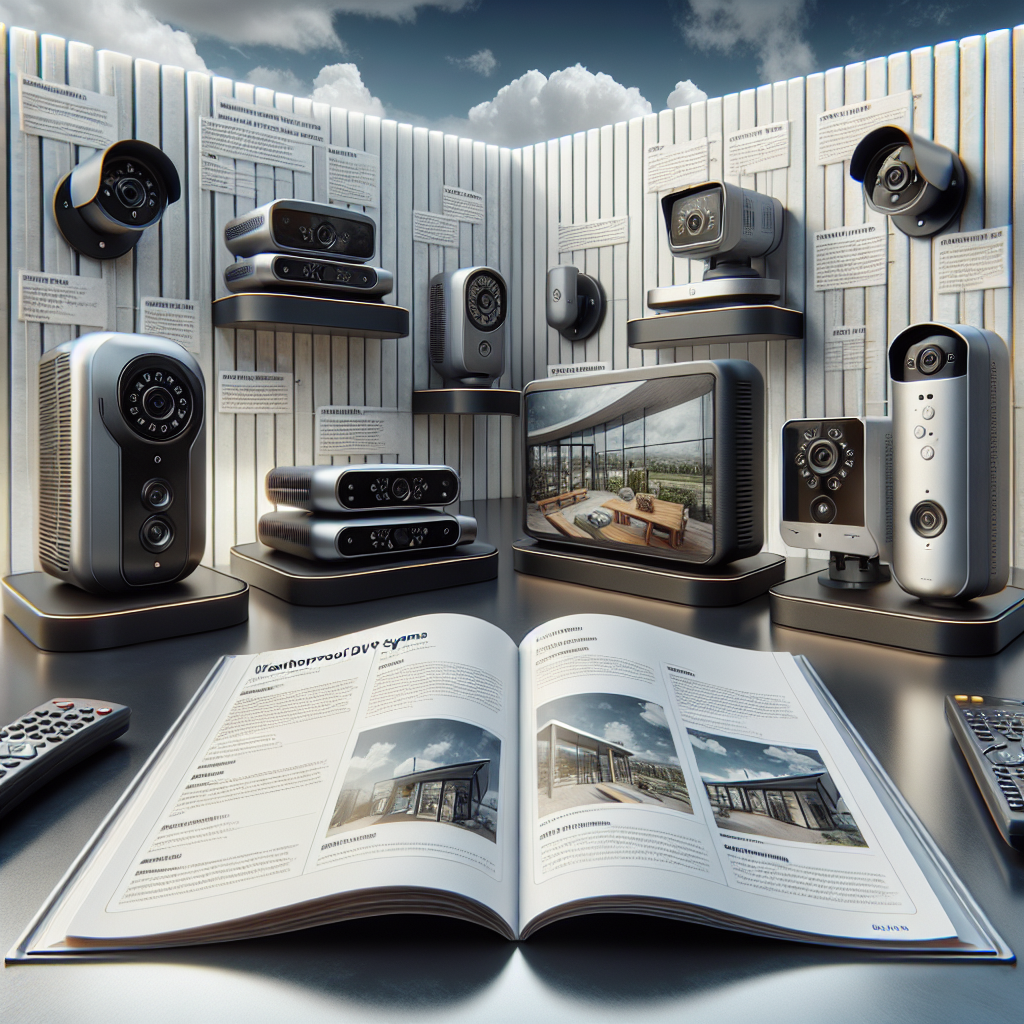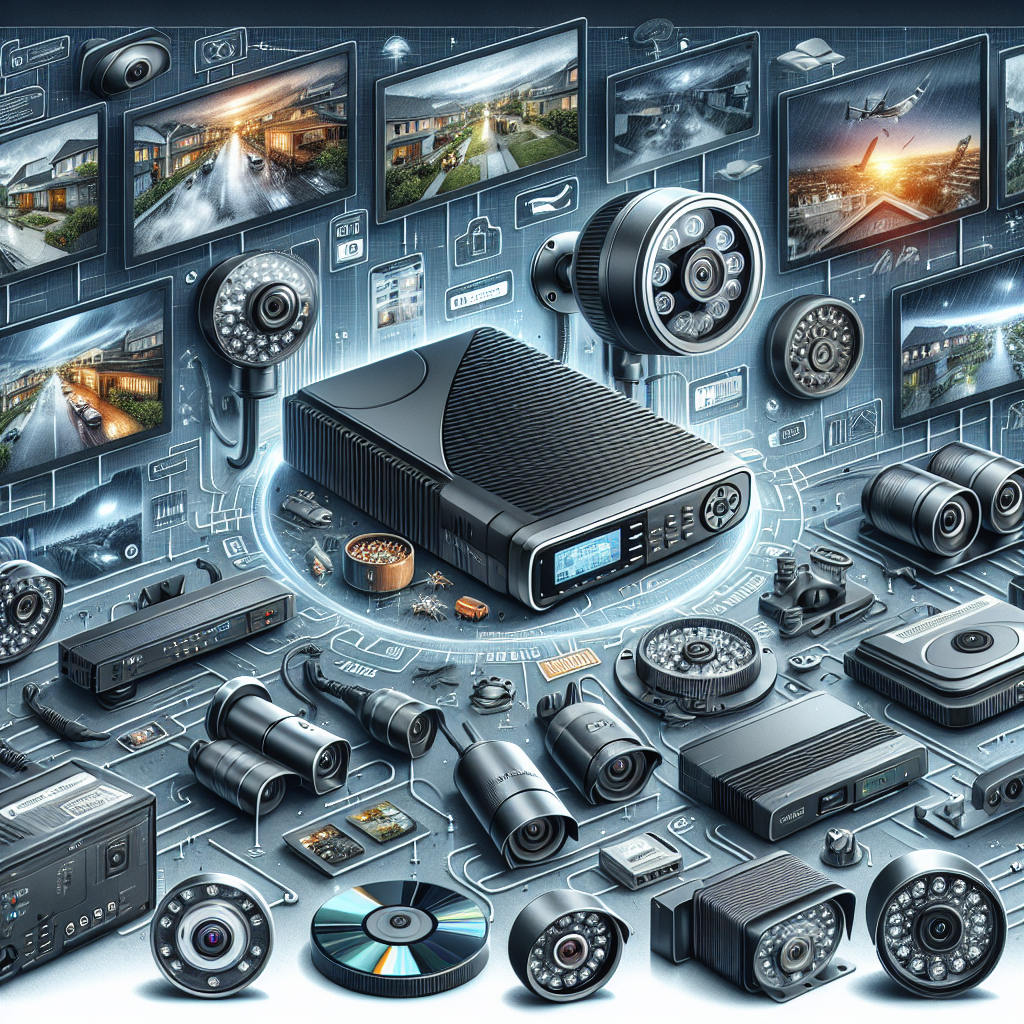Are you tired of constantly replacing your outdoor surveillance system due to weather damage? Look no further, as we unveil the best weatherproof DVR systems designed for outdoor use in our comprehensive guide. These innovative and durable systems are built to withstand the harshest weather conditions, ensuring uninterrupted surveillance footage no matter what Mother Nature throws your way. From rain and snow to extreme heat and cold, these weatherproof DVR systems provide peace of mind and reliable performance for all your outdoor security needs. Say goodbye to weather-related worries and hello to top-notch outdoor surveillance with our expertly selected DVR systems.
Understanding Weatherproof DVR Systems

Weatherproof DVR systems are specialized surveillance equipment designed to withstand outdoor conditions while providing reliable recording and monitoring capabilities. These systems are crucial for outdoor use due to the unique challenges posed by varying weather conditions.
Definition of DVR Systems
- DVR stands for Digital Video Recorder, a device that records video in a digital format to a disk drive, USB flash drive, SD memory card, SSD, or other local or networked mass storage device.
- Weatherproof DVR systems are DVR units specifically engineered to resist environmental factors such as rain, snow, dust, and extreme temperatures, ensuring uninterrupted operation in outdoor settings.
Importance of Weatherproofing for Outdoor Use
- Protection Against Elements: Weatherproofing shields the DVR system from moisture, dust, and debris, safeguarding its internal components and ensuring long-term functionality.
- Durability: Outdoor environments expose electronic devices to harsh conditions that can compromise their lifespan. Weatherproof DVR systems are built to be durable and resilient, prolonging their operational longevity.
- Reliable Surveillance: By maintaining optimal performance in various weather conditions, weatherproof DVR systems offer continuous surveillance coverage without interruptions due to environmental factors.
Key Features of Weatherproof DVR Systems
- IP Rating: Weatherproof DVR systems are assigned an Ingress Protection (IP) rating to indicate their resistance to solids and liquids. Higher IP ratings signify better protection against environmental elements.
- Rugged Construction: These systems are constructed with robust materials that can withstand outdoor conditions, including corrosion-resistant casings and reinforced housing.
- Sealed Connectors: Weatherproof DVR systems feature sealed connectors to prevent water ingress, maintaining the integrity of the connections and internal circuitry.
- Temperature Tolerance: Designed to operate within a wide temperature range, weatherproof DVR systems can function reliably in extreme heat or cold, ensuring consistent performance in diverse climates.
Factors to Consider When Choosing a Weatherproof DVR System
When selecting a weatherproof DVR system for outdoor use, several key factors should be taken into account to ensure optimal performance and reliability.
Durability and Weather Resistance
Durability: Look for DVR systems that are specifically designed to withstand harsh outdoor conditions such as rain, snow, dust, and extreme temperatures. Opt for units with rugged construction and high-quality materials that can endure outdoor elements without deteriorating.
Weather Resistance: Ensure that the DVR system is IP66 or IP67 rated for water and dust resistance. This rating indicates that the system is fully sealed against dust ingress and can withstand powerful water jets, making it suitable for outdoor installation.
Video Resolution and Clarity
Video Resolution: Choose a DVR system with high-definition (HD) or even ultra HD (4K) resolution for crisp and detailed video footage. Higher resolution ensures clearer images, making it easier to identify individuals or objects in the footage, which is crucial for security purposes.
Clarity: Consider features such as infrared night vision and wide dynamic range (WDR) to enhance video clarity in various lighting conditions. These features help capture sharp and detailed images both during the day and at night, providing comprehensive surveillance coverage.
Storage Capacity and Expandability
Storage Capacity: Evaluate the DVR system’s storage capacity to ensure it can accommodate the amount of video data generated. Opt for systems with ample storage space or the ability to expand storage through external hard drives or cloud storage options to prevent data loss and overwrite issues.
Expandability: Look for DVR systems that support expandable storage options, such as additional hard drive bays or network-attached storage (NAS) compatibility. This allows for scalability as surveillance needs grow, ensuring long-term data retention without compromising video quality.
Remote Viewing and Mobile App Integration
Remote Viewing: Choose a weatherproof DVR system that offers remote viewing capabilities, allowing you to access live or recorded footage from anywhere using a computer or mobile device. Remote viewing enables real-time monitoring and playback, enhancing security and convenience.
Mobile App Integration: Opt for DVR systems that are compatible with mobile apps for seamless integration with smartphones or tablets. Mobile apps provide easy access to surveillance feeds, alerts, and settings, enabling on-the-go monitoring and control of the system for enhanced security management.
Installation and Setup of Weatherproof DVR Systems
Weatherproof DVR systems are essential for outdoor surveillance to ensure optimal performance and longevity of the equipment. Here are the key considerations for the installation and setup of these systems:
- Placement Considerations for Outdoor Use
When installing a weatherproof DVR system outdoors, it is crucial to consider the following factors:
-
Protection from the Elements: Ensure the DVR unit is placed in a sheltered area to shield it from direct sunlight, rain, snow, and other harsh weather conditions.
-
Secure Mounting: Mount the DVR system securely on a stable surface to prevent it from being easily tampered with or stolen.
-
Accessibility: Place the DVR unit in a location that allows for easy access for maintenance and servicing while also being discreet to avoid detection by potential intruders.
-
Proper Weatherproofing Installation Techniques
To protect the DVR system from environmental damage, it is essential to employ proper weatherproofing techniques:
-
Sealed Enclosures: Use weatherproof enclosures specifically designed for outdoor use to house the DVR unit and protect it from moisture and dust.
-
Waterproof Cable Connections: Ensure all cable connections are properly sealed with waterproof connectors to prevent water ingress and corrosion.
-
Surge Protection: Install surge protectors to safeguard the DVR system from power surges and lightning strikes that could damage the equipment.
-
Connecting Cameras and Setting Up Remote Access
To complete the installation and setup of a weatherproof DVR system for outdoor use, follow these steps:
-
Camera Placement: Position the cameras strategically to cover the desired surveillance area while ensuring they are also protected from the elements.
-
Cabling: Run high-quality, weatherproof cables to connect the cameras to the DVR unit, making sure to secure and conceal the cables to prevent tampering.
-
Remote Access Setup: Configure the DVR system for remote access via a secure network connection, enabling users to monitor the surveillance footage from anywhere using a smartphone or computer.

Best Practices for Maintaining Weatherproof DVR Systems
- Regular Cleaning and Inspection
Proper maintenance of weatherproof DVR systems involves regular cleaning and inspection to ensure optimal performance and longevity. Dust, dirt, and debris can accumulate on the exterior and lenses of the cameras, impacting image quality and overall functionality. It is recommended to gently wipe down the cameras and DVR unit with a soft, dry cloth to remove any buildup. Additionally, inspecting the system for any signs of damage or wear can help prevent potential issues before they escalate.
- Monitoring System Performance
Monitoring the performance of weatherproof DVR systems is essential for identifying any irregularities or malfunctions. Keeping track of system activity, such as recording schedules, motion detection alerts, and remote access, can help detect any anomalies that may indicate a problem. Regularly reviewing footage captured by the cameras can also provide insights into the system’s effectiveness and alert users to any potential issues that need addressing.
- Updating Firmware and Software

Keeping the firmware and software of weatherproof DVR systems up to date is crucial for ensuring security and functionality. Manufacturers often release updates that address vulnerabilities, improve performance, and introduce new features. It is recommended to regularly check for updates and install them promptly to safeguard the system against potential security threats and ensure compatibility with other devices.
Common Misconceptions About Weatherproof DVR Systems
Myth: Weatherproof DVR Systems Are Completely Immune to Environmental Factors
Weatherproof DVR systems are designed to withstand various weather conditions, such as rain, snow, and extreme temperatures. However, it is important to note that while these systems are built to be weather-resistant, they are not completely immune to environmental factors. Extended exposure to harsh conditions can still potentially damage the system over time if not properly maintained.
Myth: Any DVR System Can Be Used Outdoors with Proper Covering
Not all DVR systems are suitable for outdoor use, even with proper covering. Weatherproof DVR systems are specifically engineered to ensure durability and functionality in outdoor environments. Using an indoor DVR system outdoors, even with protection, can lead to malfunctions due to the system not being equipped to handle outdoor elements like moisture, dust, and fluctuating temperatures.
Myth: Weatherproof DVR Systems Are Complicated to Install and Use
Weatherproof DVR systems are designed with user-friendly features to simplify installation and operation. Many of these systems come with easy-to-follow instructions and intuitive interfaces, making them accessible to both novice and experienced users. Contrary to popular belief, setting up and utilizing a weatherproof DVR system for outdoor surveillance is typically straightforward and hassle-free.
FAQs
What are weatherproof DVR systems?
Weatherproof DVR systems are surveillance systems designed to withstand outdoor elements such as rain, snow, and extreme temperatures. These systems are built to protect the DVR unit and cameras from damage caused by weather conditions, ensuring continuous operation and reliable footage in any outdoor environment.
What features should I look for in a weatherproof DVR system?
When choosing a weatherproof DVR system for outdoor use, it is important to look for features such as a high IP rating (Ingress Protection) for water and dust resistance, durable construction materials, night vision capabilities, remote viewing options, and compatibility with various camera types. Additionally, consider factors like storage capacity, motion detection, and ease of installation.
Are weatherproof DVR systems easy to install?
Most weatherproof DVR systems are designed for easy installation, with mounting hardware and step-by-step instructions included in the package. However, some systems may require professional installation for optimal performance. Before purchasing a weatherproof DVR system, consider your technical skills and the complexity of the setup process.
How do weatherproof DVR systems protect against vandalism and theft?
Weatherproof DVR systems serve as a deterrent to vandalism and theft by providing constant surveillance and recording capabilities. In the event of a security breach or attempted theft, the footage captured by the outdoor cameras can be used as evidence to identify culprits and take appropriate action. Additionally, some weatherproof DVR systems offer advanced security features like motion detection alerts and remote monitoring to enhance protection.
Can weatherproof DVR systems be used in extreme weather conditions?
Yes, weatherproof DVR systems are specifically designed to withstand extreme weather conditions, including high winds, heavy rain, snowstorms, and harsh sunlight. With their durable construction and weather-resistant materials, these systems are built to operate reliably in any outdoor environment, providing continuous surveillance and protection for your property.